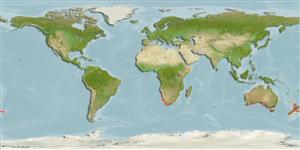>
Eupercaria/misc (Various families in series Eupercaria) >
Emmelichthyidae (Rovers)
Etymology: Plagiogeneion: Greek, plagios = oblique + Greek, geny, genyos, diminutive = face (Ref. 45335).
Environment: milieu / climate zone / depth range / distribution range
Ecología
marino batidemersal; rango de profundidad 30 - 600 m (Ref. 106682). Deep-water; 22°S - 40°S, 14°E - 170°E
Distribución
Países | Áreas FAO | Ecosistemas | Ocurrencias, apariciones | Point map | Introducciones | Faunafri
Southeast Atlantic: Vema Seamount west of Cape Town and off Algoa Bay, and Walvis Bay in Namibia. Southern Indo-West Pacific: St. Paul and Amsterdam Islands, southern Australia, and New Zealand.
Tamaño / Peso / Age
Maturity: Lm ? range ? - ? cm
Max length : 60.0 cm TL macho / no sexado; (Ref. 5325); common length : 40.0 cm TL macho / no sexado; (Ref. 115123); edad máxima reportada: 10 años (Ref. 35378)
Short description
Claves de identificación | Morfología | Morfometría
Espinas dorsales (total) : 12; Radios blandos dorsales (total) : 10 - 12; Espinas anales: 3; Radios blandos anales: 10. Rosy pink in color, brownish dorsally, silvery below; fins red, tips of caudal fin blackish (Ref. 5325).
Adults occur near sandy or muddy bottom in deep water. Feeds on larger zooplankton (Ref. 3394). Marketed fresh or frozen and proves to be an excellent foodfish (Ref. 115123).
Life cycle and mating behavior
Maturities | Reproducción | Spawnings | Egg(s) | Fecundities | Larva
Heemstra, P.C., 2016. Emmelichthyidae. pp. 2526-2533. In K.E. Carpenter and N. De Angelis (eds.). The living marine resources of the Eastern Central Atlantic. Vol. 4: Bony fishes part 2 (Perciformes to Tetradontiformes) and sea turtles. FAO Species Identification Guide for Fishery Purposes, Rome, FAO. pp. 2343-3124. (Ref. 115123)
IUCN Red List Status (Ref. 130435)
Threat to humans
Harmless
Human uses
Pesquerías: comercial
Herramientas
Special reports
Download XML
Fuentes de Internet
Estimates based on models
Preferred temperature (Ref.
123201): 9 - 19.7, mean 14.2 °C (based on 63 cells).
Phylogenetic diversity index (Ref.
82804): PD
50 = 0.5313 [Uniqueness, from 0.5 = low to 2.0 = high].
Bayesian length-weight: a=0.01047 (0.00491 - 0.02235), b=3.07 (2.87 - 3.27), in cm total length, based on LWR estimates for this species & (Sub)family-body (Ref.
93245).
Nivel trófico (Ref.
69278): 3.4 ±0.45 se; based on food items.
Generation time: 3.7 ( na - na) years. Estimated as median ln(3)/K based on 1
growth studies.
Resiliencia (Ref.
120179): Medio, población duplicada en un tiempo mínimo de 1.4-4.4 años (tmax=10; K=0.33; tm=3-4).
Fishing Vulnerability (Ref.
59153): Moderate vulnerability (41 of 100).
Nutrients (Ref.
124155): Calcium = 24 [15, 56] mg/100g; Iron = 0.518 [0.212, 0.995] mg/100g; Protein = 17.8 [16.8, 18.7] %; Omega3 = 0.365 [0.214, 0.620] g/100g; Selenium = 18.2 [8.0, 38.5] μg/100g; VitaminA = 11.7 [2.7, 51.2] μg/100g; Zinc = 0.367 [0.255, 0.547] mg/100g (wet weight);
